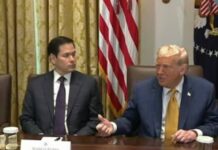
There’s a war in Washington, D.C. right now. The Supreme Court is at the center of it all.
And now a U.S. Supreme Court clerk has shocked Washington, D.C. with a surprise confession about Trump.
Mike Davis, a former law clerk for U.S. Supreme Court Justice Neil Gorsuch, made waves on Fox News this past Monday when he asserted that President Donald Trump has a “constitutional duty” to address government waste. Davis, speaking on “The Ingraham Angle,” highlighted Trump’s responsibility in managing taxpayer money, emphasizing that he must ensure funds are used effectively and efficiently under the U.S. Constitution.
According to Davis, one of the agencies most in need of oversight is the U.S. Agency for International Development (USAID). He criticized the agency as serving as the “elite’s party planner” and pointed to the significant concerns about taxpayer dollars being misused under its programs. Trump, together with Elon Musk from the Department of Government Efficiency (DOGE), has announced plans to overhaul USAID, placing it under the leadership of Secretary of State Marco Rubio. This move, however, has faced staunch opposition from Democrats, who have filed numerous lawsuits attempting to block the president’s initiative.
In his remarks, Davis referenced Musk’s support for the administration’s push to clean up government waste, quoting Musk’s warning to the press that if the president is prevented from scrutinizing government funds, the U.S. could become a “bureaucracy” bogged down in inefficiency and waste. “The president is in charge of the executive branch. He has a constitutional duty under Article II of our Constitution to take care that our laws are faithfully executed,” Davis remarked. “That includes these Appropriations by Congress and by these administrative agencies when they’re spending money to make sure that it’s not being misspent.”
Davis further emphasized that Trump’s efforts to address waste, fraud, and abuse should be applauded, citing specific examples like U.S. funds sent to Gaza to support the United Nations, which Davis argued was being used to fund terrorism, particularly Hamas. He also expressed his support for Musk’s role as a “heat shield” for Trump, helping protect the administration’s initiatives from political pushback.
Reports have surfaced suggesting that USAID, under previous administrations, funneled taxpayer dollars into programs that supported left-wing social engineering abroad and, in some cases, funded organizations linked to terrorism or controversial research initiatives, such as those connected to the Wuhan Institute of Virology. Despite these reports, Democratic lawmakers have continued to resist Trump’s agenda. A notable example was a protest outside the Department of Treasury building on February 4, where Democratic Rep. LaMonica McIver of New Jersey was seen leading chants against Trump and Musk, declaring that they were at “war” with the administration over its approach to government reform.
Davis, in his interview, responded to concerns raised by former USAID workers, who appeared on a recent episode of “60 Minutes.” They claimed that the Trump administration was demanding “pure loyalty tests” and fostering an atmosphere of fear within the department. “The USAID has become the elite’s job program, their party planner, their travel agents, right?” Davis argued, pointing to the apparent disconnect between Washington elites and the everyday realities of American workers. He specifically mentioned Samantha Power, the former press secretary, as an example of the type of “elitists” that Davis believes are out of touch with real Americans.
In a legal victory for Trump’s administration, a federal judge recently sided with the Department of Government Efficiency, rejecting attempts to block its access to records containing personal information from the Health and Human Services Department, the Labor Department, and the Consumer Financial Protection Bureau. The judge ruled that the plaintiffs failed to meet the necessary legal standard to block the access, paving the way for continued scrutiny of government operations.
The White House Defense Of Musk’s DOGE Efforts Are Strong, Say Experts
The White House has officially classified Elon Musk as an unpaid “special government employee,” a designation established by Congress in 1962 for temporary executive branch hires. This status allows individuals to perform limited duties for no more than 130 days.
Sarah Isgur, a former Justice Department official during Trump’s first term and ABC News legal contributor, expressed support for the classification. “I think they have a good case,” she remarked, adding that Musk is “obviously an ‘officer of the U.S.'” However, she also pointed out that the title of “special government employee” has never been tested or defined by the courts, which could leave room for legal challenges.
The White House has further justified Musk’s appointment by invoking a legal theory that the president holds near-unrestricted authority to hire and fire individuals within the executive branch. “With a great team around them, we’re going to look at the receipts of this federal government and ensure it’s accountable to American taxpayers,” White House press secretary Karoline Leavitt stated last month in defense of Musk’s role as an advisor.
Some legal scholars suggest that the ambiguity surrounding Musk’s precise actions within the government could make it difficult for critics to mount a successful legal challenge. “I think these sorts of early lawsuits will flame out because we truly don’t know what Musk is doing. We are mostly left with conjecture and speculation,” said Josh Blackman, a constitutional law professor at South Texas College of Law. He noted that as long as an actual government official is overseeing decisions, it’s unclear whether Musk holds significant authority.
The legal challenges regarding Musk’s appointment are still in the early stages and may take months to resolve. Even if the cases move forward, legal experts caution that their practical impact could be minimal. As Blackman pointed out, “By July 4, 2026, Musk will be out of office, and then something like the ‘de facto officer’ doctrine could save whatever work Musk did. I don’t see these cases as going anywhere.”
The Federalist Wire will update you on any major news from the Department of Government Efficiency.



















